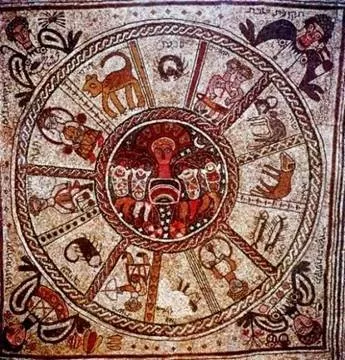Feb 17, 2022
Image: Floor mosaic 6th century synagogue at Beth-Alpha – wikipidia.org
One of the deepest mysteries in the history of man has been the heavens according to livescience.com. The sky and what it contains are beyond comprehension of most human beings.
The Sun and the Moon are our constant companions, markers of the season and the inner workings of plants and animals. The weather changes, seeming to have moods of its own and yet on a clear, calm night, you can see the groups of stars that pattern the sky with familiar shapes that man has given names to. And we can see, as the seasons change that these patterns move in a predictable manner.
With human beings interest in the skies, we have the heart of separate stories: Astronomy and Astrology.
First, Astronomy is the scientific study of the Sun, the Moon and the stars. Its origins can be traced back to the early civilizations of Mesopotamia (an area corresponding to modern-day Iraq, Kuwait, the northeastern section of Syria and to a much lesser extent southeastern Turkey and smaller parts of southwestern Iran) where observers of the heavens recognized prominent groups of stars (constellations - the patterns formed by stars in the galaxy) and gave them names soon after 3,000 BCE. They also identified the five “wandering stars” which, with the Sun and Moon form the seven original observable ‘planets.’
Bronze Age Mesopotamia included Sumer and the Akkadian, Babylonian and Assyrian empires and it was the Babylonians, flourishing from the 18th Century BCE who were the first great astronomers. They introduced the concept of the Zodiac and gave us the currently used “minutes” and “seconds” of astronomical measurement.
Astronomy is the scientific study of sun, moon and stars. Astrology is considered by some a pseudo-science but interpreting the supposed effect of the heavenly bodies on human existence. In early history the two were very closely linked. The sky was the home of many of the gods, who influenced life on earth and it was believed the patterns in the sky must surely reflect that influence.
These great Astronomers realized that the Zodiac could serve as a yardstick of celestial time if divided into equal segments by observing and measuring the movements of the Sun, Moon and planets as they moved through them.
It was the Babylonian Astronomers who chose the twelve constellations to represent these segments and gave them names – most of which were animals. It was the Greeks who later gave this system its current label, “Zodiac” which means, literally, animal circle (zodiakos kyklos).
This is where the link between Astronomy and Astrology were the strongest and all serious observers of the heavens were considered Astrologer-Astronomers. These specially talented people realized that the Zodiac links the constellations with the time of the year and then linked them to the gods. So scientific observation of star positions merges with speculation about divine influence. The Zodiac, as a concept, was and still is of use to both astronomers and astrologers today.
Many years after the great discoveries of the Babylonians, the Greeks made significant advances in both Astronomy and Astrology. Their analytic approach lead to early significant insights in the motion of the heavenly bodies which were to later both confound and confuse European Astronomers who clung to the Ptolemaic (Earth-centered as opposed to Sun-centered) version of how the system worked.
It was the Greeks who passed on the most important psychological aspects of Astrology. The very human divinities, when linked to the “wanderers” up in the heavens, gave Astrology drama and excitement. They personalized the chart and allowed Astrology to migrate from helping in affairs of state to working for the ordinary human being.
Looking further east, we look back on India’s role in Astrology and its unique system. It dates back as early as 1,000 BCE and is based on the Sidereal universe acknowledging the actual movement (precession) of the stars and planets so that they do not give as much credence to the signs but more to the houses. India has kept Astrology as an important element in everyday life in that no important step in life can be safely undertaken unless the signs are propitious and no marriage will go ahead without intricate horoscopes being drawn up.
But it was the Hellenistic system of Astrology that led to the Western version we use today. The spread of Arabic scholarship throughout medieval Europe and the exposure of the long forgotten Greek texts kept their system in focus. Unfortunately, the discoveries in science and the Age of Reason somewhat diminished the appeal of this most ancient practice.
Astrology is enjoying a serious resurgence throughout the world but many see it as an art as opposed to a science. Many think of it as a light-hearted indulgence but look at any newspaper and you’ll find a daily horoscope included within its pages. But there are serious practitioners out there doing research and having awesome results in many, many key fields. Finding epicenters and the timing for earthquakes, having an early warning system for severe weather, gauging political and monetary trends all are matters of intense study by today’s Astrologers. It is being taken more seriously as their results are published.
Will Astrology enjoy the celebrity it did in times gone by? It’s hard to say, but be assured that with each Astrologer’s repeatable results (important in the scientific community) it comes closer to gaining the respect it deserves.
Share this article with friends!
Tags:
#history#of#astrology,#zodiac,#astrology#signs,#starzpsychics

